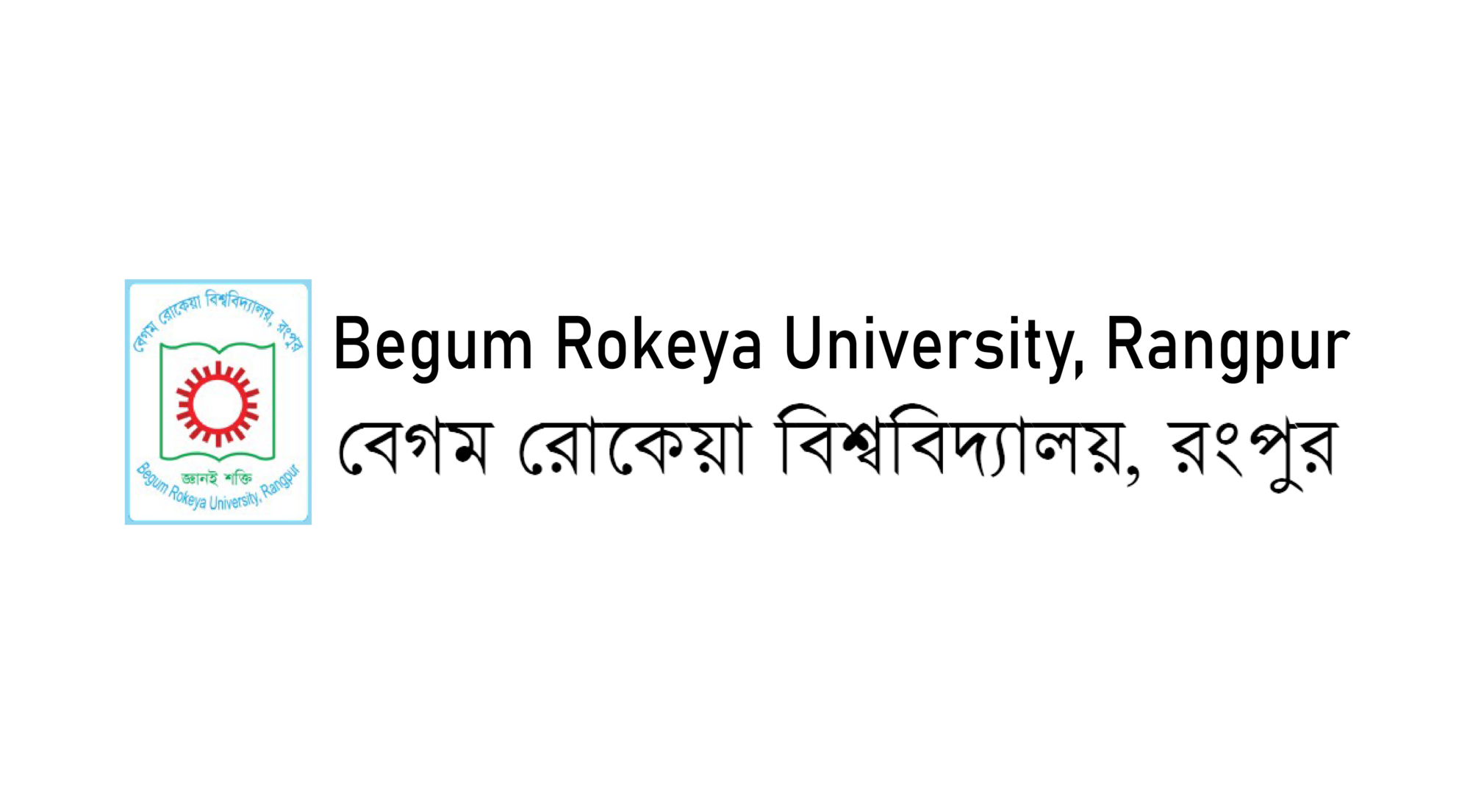Begum Rokeya University, Rangpur (BRUR) continues to make significant strides in global research, contributing across diverse scientific domains, particularly within environmental sciences, materials science, and physics. In 2024, BRUR’s research garnered attention in major Web of Science indexes, including the Science Citation Index Expanded, with a remarkable focus on multidisciplinary sciences and the development of sustainable technologies. The university’s research activities are highly collaborative, with contributions from researchers across Bangladesh, Saudi Arabia, India, and several other nations. BRUR’s publishing output is largely dominated by articles, and it has established strong affiliations with top-tier publishers like Elsevier and Springer Nature. Web of Science
The leading areas of research publication categories in the TreeMap:
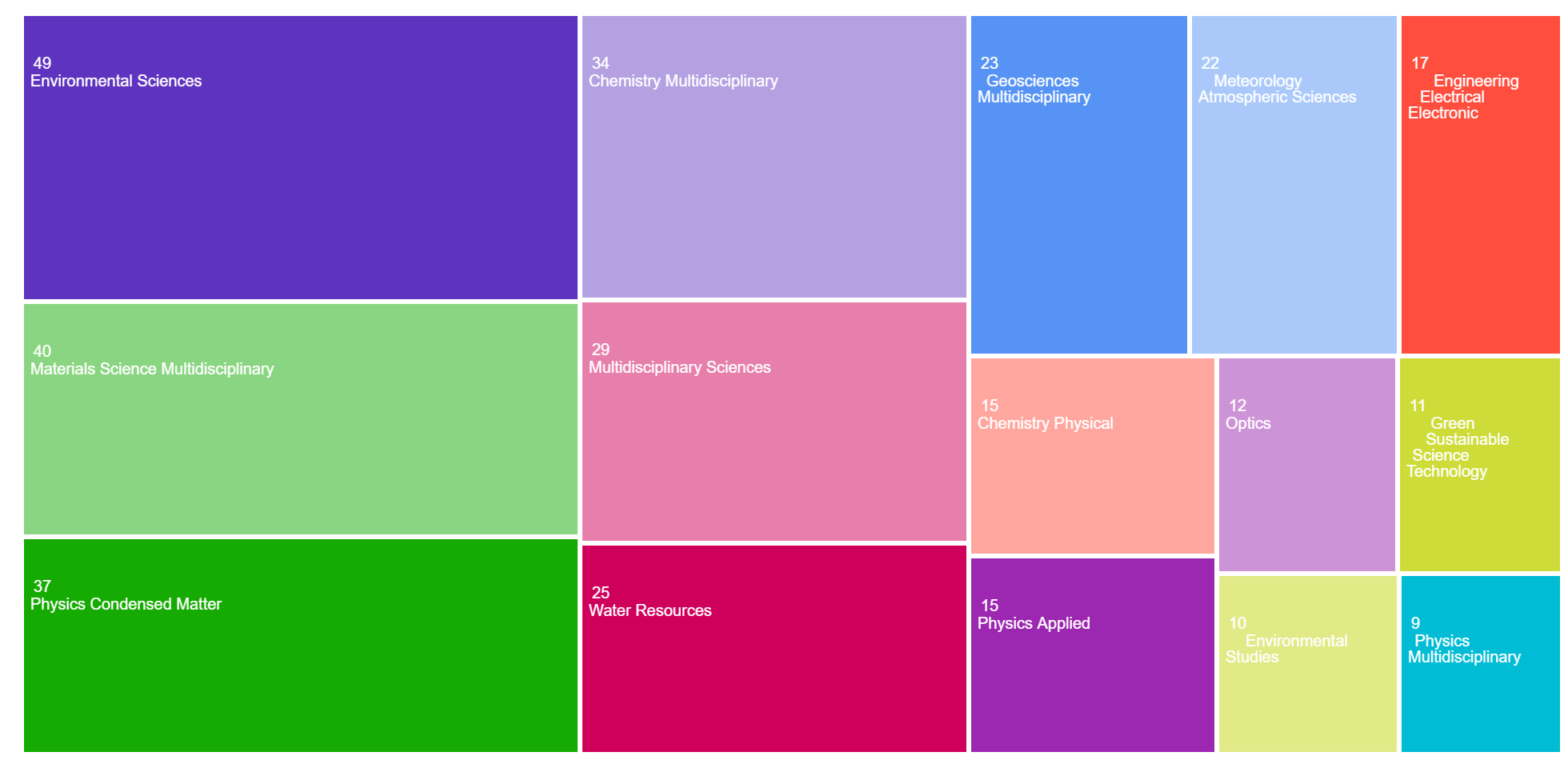
Major contributions in the field include (leading 25):
| Web of Science Categories | Record Count | % of 281 |
|---|---|---|
| Environmental Sciences | 49 | 17.438% |
| Materials Science Multidisciplinary | 40 | 14.235% |
| Physics Condensed Matter | 37 | 13.167% |
| Chemistry Multidisciplinary | 34 | 12.100% |
| Multidisciplinary Sciences | 29 | 10.320% |
| Water Resources | 25 | 8.897% |
| Geosciences Multidisciplinary | 23 | 8.185% |
| Meteorology Atmospheric Sciences | 22 | 7.829% |
| Engineering Electrical Electronic | 17 | 6.050% |
| Chemistry Physical | 15 | 5.338% |
| Physics Applied | 15 | 5.338% |
| Optics | 12 | 4.270% |
| Green Sustainable Science Technology | 11 | 3.915% |
| Environmental Studies | 10 | 3.559% |
| Physics Multidisciplinary | 9 | 3.203% |
| Chemistry Inorganic Nuclear | 8 | 2.847% |
| Public Environmental Occupational Health | 8 | 2.847% |
| Energy Fuels | 7 | 2.491% |
| Marine Freshwater Biology | 6 | 2.135% |
| Physics Atomic Molecular Chemical | 6 | 2.135% |
| Chemistry Analytical | 5 | 1.779% |
| Ecology | 5 | 1.779% |
| Economics | 5 | 1.779% |
| Business | 4 | 1.423% |
| Engineering Chemical | 4 | 1.423% |
Research areas (Top 25):
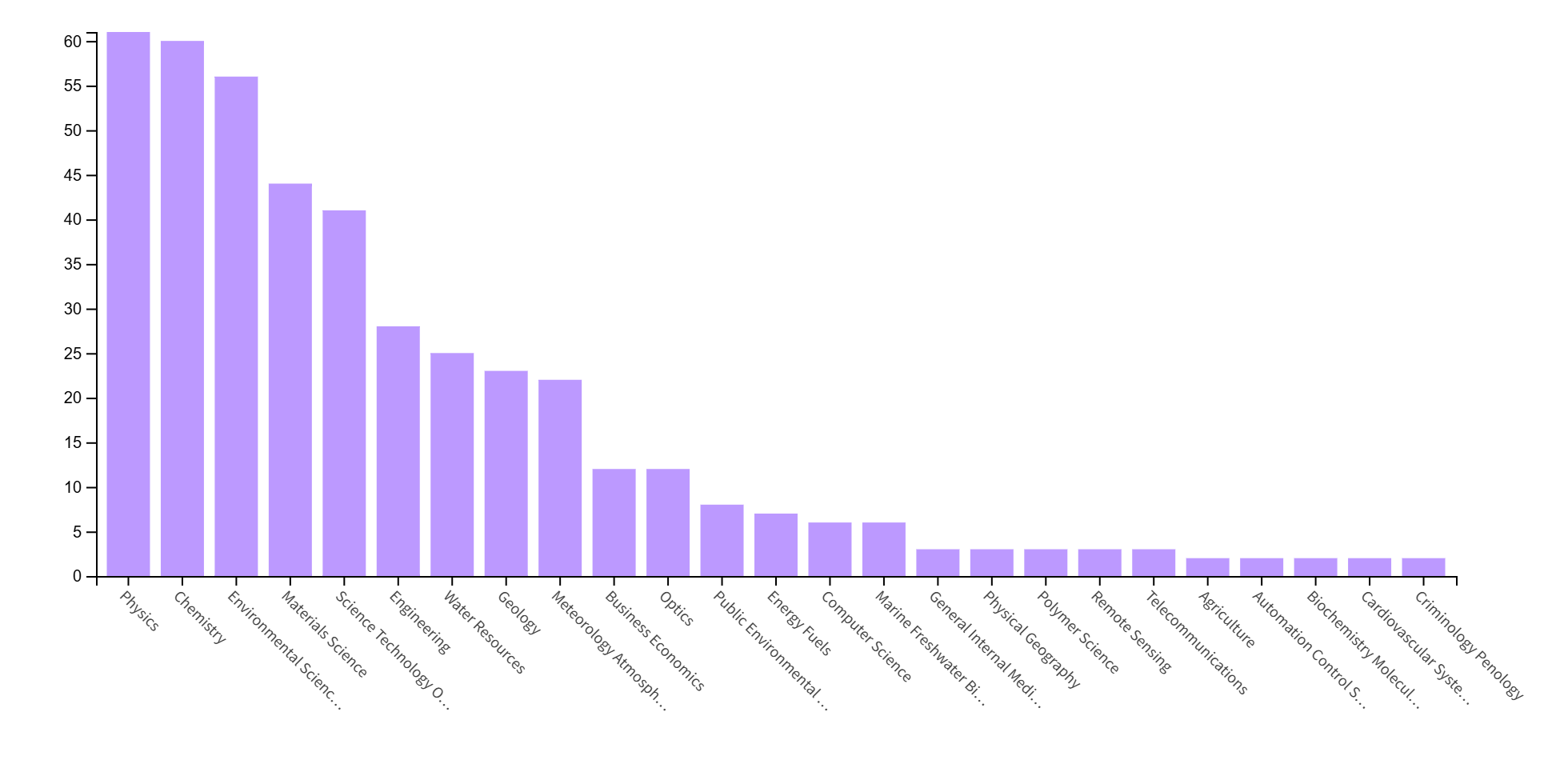
Types of published documents:
| Document Types | Record Count | % of 281 |
|---|---|---|
| Article | 255 | 90.747% |
| Review Article | 18 | 6.406% |
| Early Access | 16 | 5.694% |
| Correction | 3 | 1.068% |
| Book Review | 1 | 0.356% |
| Editorial Material | 1 | 0.356% |
| Letter | 1 | 0.356% |
| Meeting Abstract | 1 | 0.356% |
| Reprint | 1 | 0.356% |
Authors’ infographic (25):
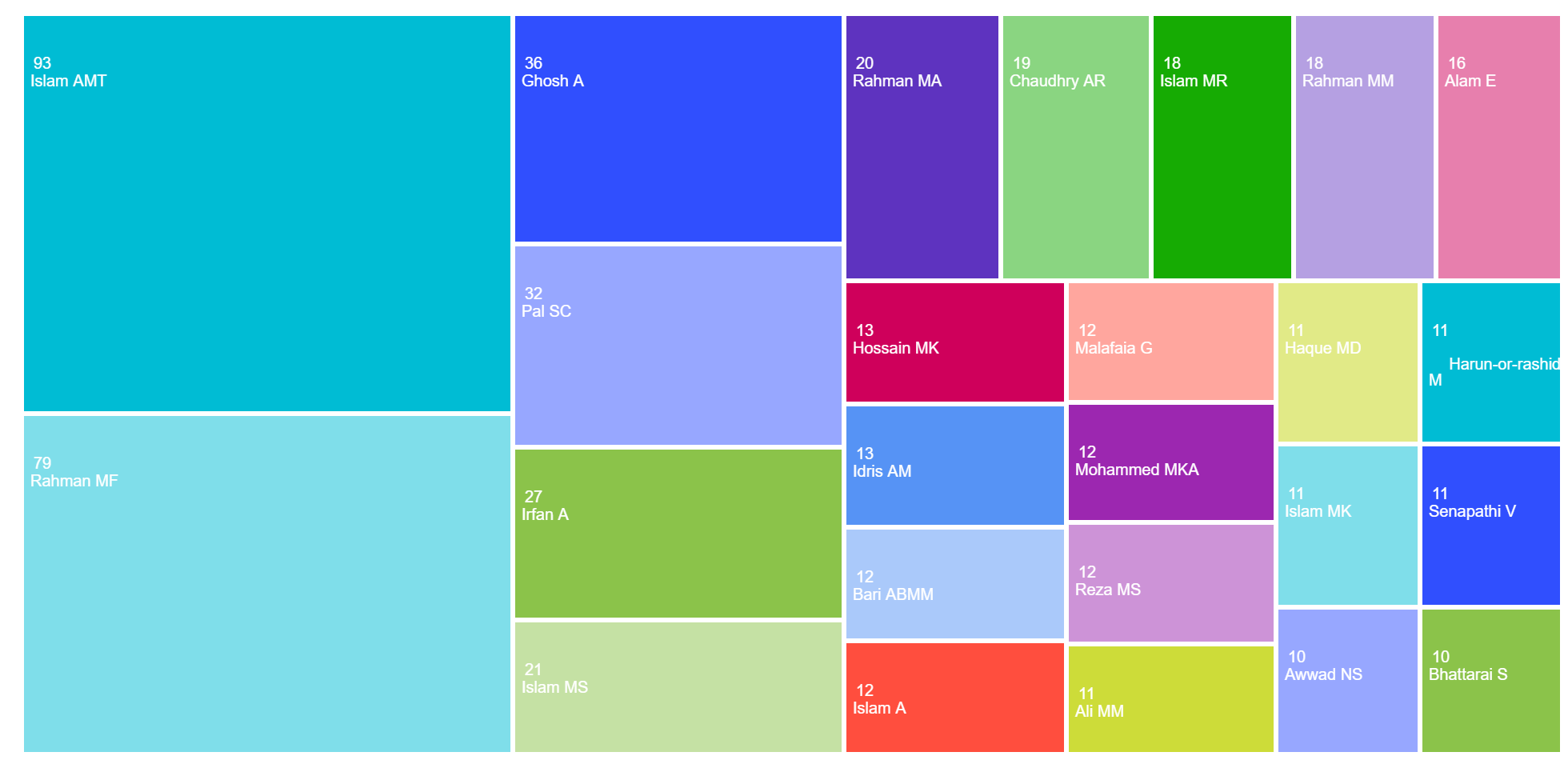
Researcher profiles (25):
| Researcher Profiles | Record Count |
|---|---|
| Rahman, Md. Ferdous | 79 |
| Islam, Abu | 71 |
| Ghosh, Avijit | 33 |
| Pal, Subodh Chandra | 32 |
| Islam, Abu Reza Md. Towfiqul | 29 |
| Irfan, Ahmad | 22 |
| CHAUDHRY, AIJAZ RASOOL | 19 |
| Islam, Md Rasidul | 17 |
| Alam, Edris | 16 |
| Idris, Abubakr | 13 |
| Hossain, M. Khalid | 13 |
| Islam, Aznarul | 12 |
| Malafaia, Guilherme | 12 |
| Reza, Md. Selim | 12 |
| Venkatramanan, Dr Senapathi | 11 |
| Mohammed, Mustafa K. A. | 11 |
| Haque, Md. Dulal | 11 |
| Bari, A. B. M. Mainul | 11 |
| Harun-Or-Rashid, Md. | 11 |
| Awwad, Nasser S. | 10 |
| Bhattarai, Sagar | 10 |
| ISLAM, KAMRUL | 10 |
| Reza, Md. Shamim | 10 |
| Mallick, Javed | 10 |
| Rahman, Azizur | 10 |
Research affiliated countries/regions of BRUR:
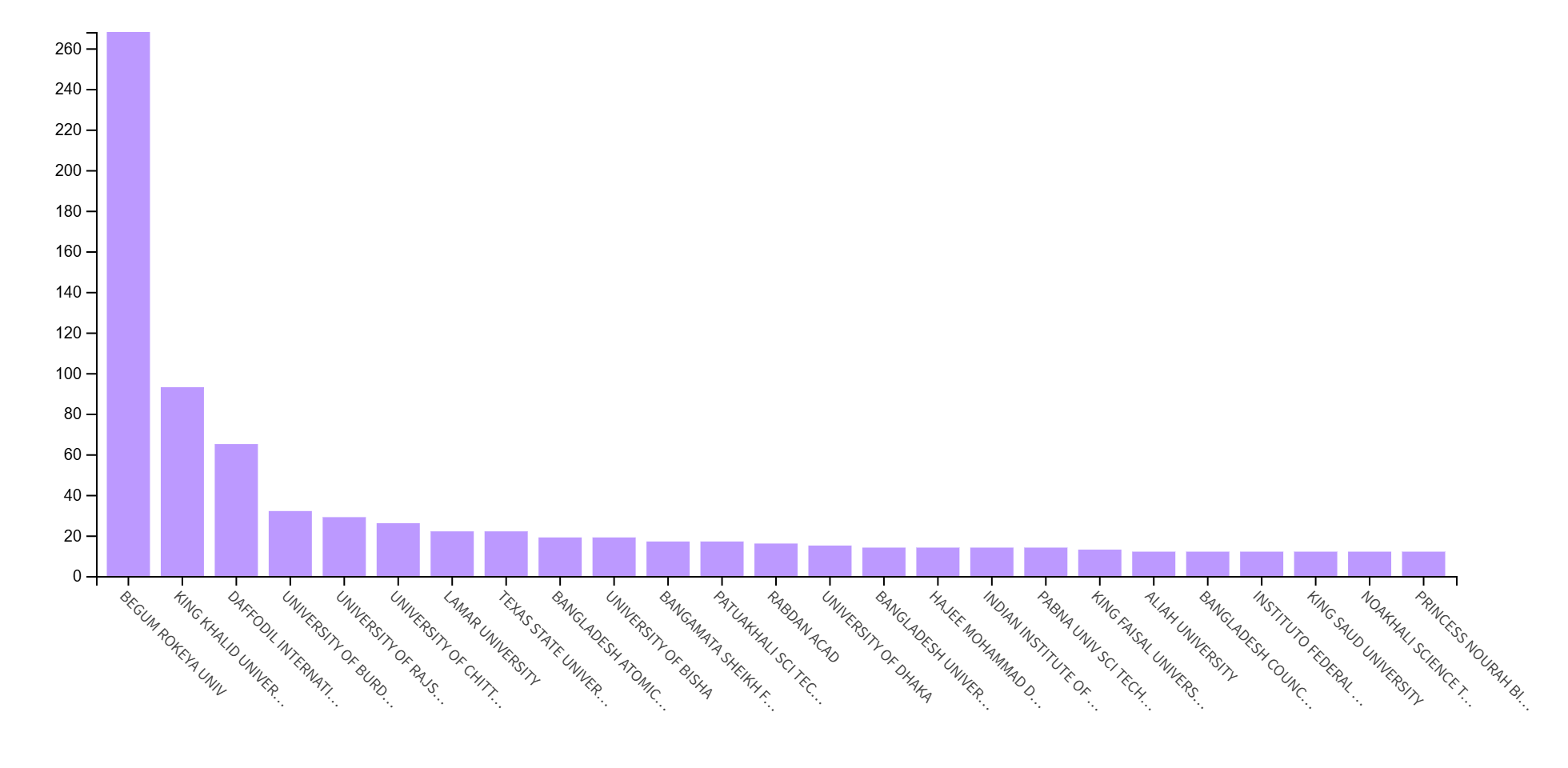
Research collaboration countries (Top 25):
| Countries/Regions | Record Count |
|---|---|
| BANGLADESH | 277 |
| SAUDI ARABIA | 130 |
| INDIA | 70 |
| USA | 45 |
| PEOPLES R CHINA | 34 |
| U ARAB EMIRATES | 20 |
| MALAYSIA | 19 |
| PAKISTAN | 19 |
| IRAQ | 18 |
| JAPAN | 16 |
| SOUTH KOREA | 16 |
| BRAZIL | 13 |
| AUSTRALIA | 12 |
| ENGLAND | 10 |
| MOROCCO | 10 |
| MEXICO | 9 |
| ALGERIA | 7 |
| IRAN | 7 |
| CANADA | 6 |
| ROMANIA | 6 |
| TURKIYE | 6 |
| VIETNAM | 6 |
| PALESTINE | 5 |
| SYRIA | 5 |
| THAILAND | 4 |
Sustainable development goals:
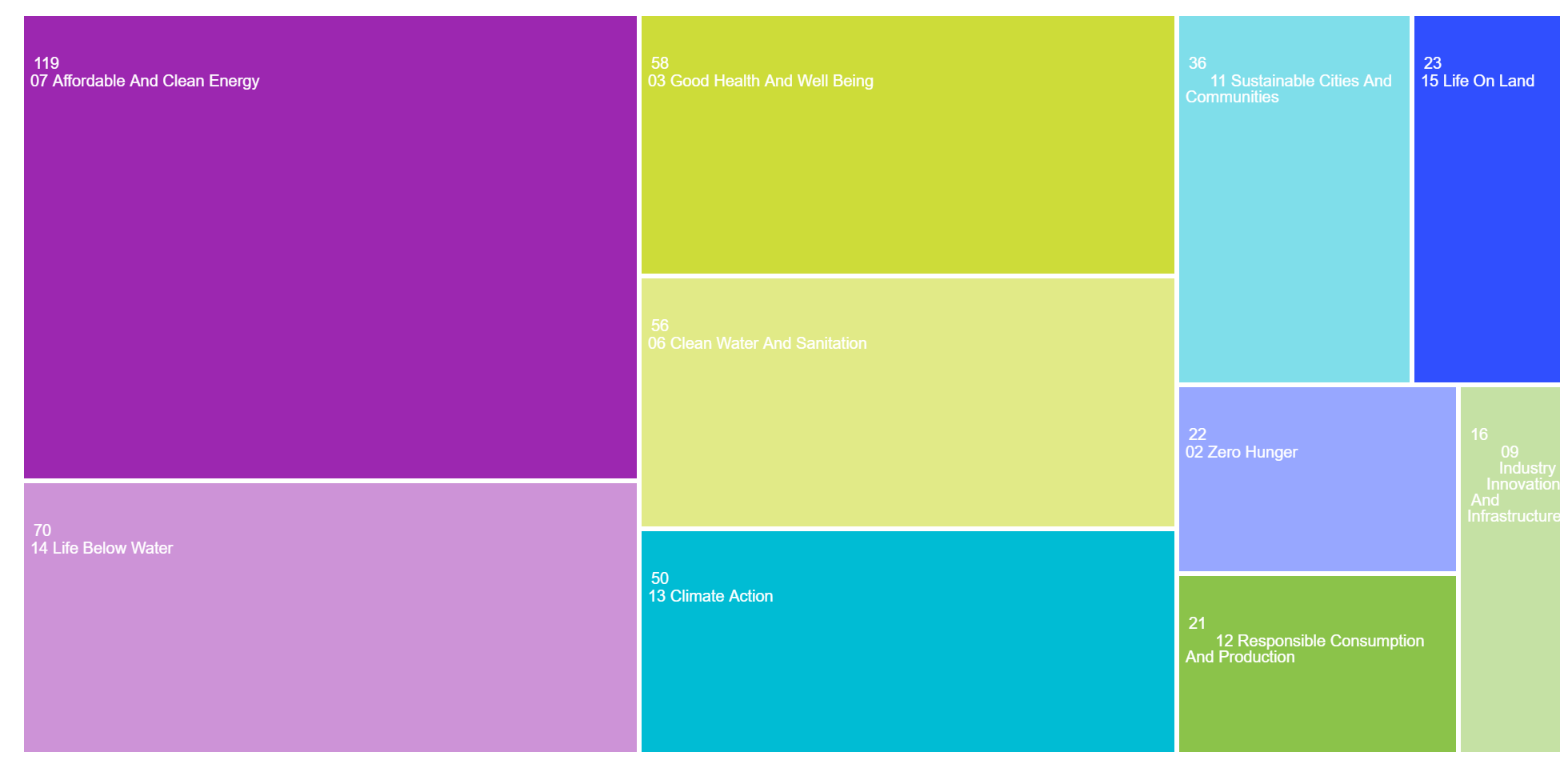
The publishers:
-
Elsevier – 126 (44.840%)
-
Springer Nature – 44 (15.658%)
-
John Wiley & Sons (Wiley) – 20 (7.117%)
-
Royal Society of Chemistry – 19 (6.762%)
-
Taylor & Francis Group – 18 (6.406%)
-
American Chemical Society (ACS) – 9 (3.203%)
-
Nature Portfolio (formerly part of Springer Nature) – 6 (2.135%)
-
Emerald Group Publishing – 5 (1.779%)
-
IOP Publishing Ltd (Institute of Physics Publishing) – 5 (1.779%)
-
Public Library of Science (PLOS) – 5 (1.779%)
-
Institute of Electrical and Electronics Engineers (IEEE) – 3 (1.068%)
-
Multidisciplinary Digital Publishing Institute (MDPI) – 3 (1.068%)
-
Springer International Publishing AG – 3 (1.068%)
-
Ubiquity Press Ltd – 2 (0.712%)
-
American Institute of Physics (AIP) Publishing – 1 (0.356%)
-
American Institute of Mathematical Sciences (AIMS) – 1 (0.356%)
-
Conscientia Beam Publishing – 1 (0.356%)
-
China University of Geosciences, Beijing – 1 (0.356%)
-
CSIRO Publishing (Commonwealth Scientific and Industrial Research Organisation) – 1 (0.356%)
-
Frontiers Media SA – 1 (0.356%)
-
Indian Association for the Cultivation of Science – 1 (0.356%)
-
International Water Association (IWA) Publishing – 1 (0.356%)
-
CPC Business Perspectives LLC – 1 (0.356%)
-
Oriental Scientific Publishing Company – 1 (0.356%)
-
SAGE Publications – 1 (0.356%)
-
Sciendo (part of De Gruyter Group) – 1 (0.356%)
-
Shahrood University of Technology – 1 (0.356%)
Web of Science Index:
| Index | Record Count | % of 281 |
|---|---|---|
| Science Citation Index Expanded (SCI-EXPANDED) | 224 | 79.715% |
| Emerging Sources Citation Index (ESCI) | 49 | 17.438% |
| Social Sciences Citation Index (SSCI) | 12 | 4.270% |
| Arts & Humanities Citation Index (A&HCI) | 2 | 0.712% |
Research Highlights of BRUR:
| Topics | Results |
|---|---|
| Highly Cited Papers | 20 |
| Hot Papers | 1 |
| Review Article | 18 |
| Early Access | 16 |
| Open Access | 100 |
| Enriched Cited References | 170 |
| Open Publisher-Invited Reviews | 8 |
Questions:
-
How does BRUR’s research impact global environmental and materials science fields?
-
What role do international collaborations play in the success of BRUR’s research output?
-
How can BRUR enhance its visibility and collaboration in emerging scientific fields?
Observations:
-
BRUR’s publications are concentrated in high-impact categories like Environmental Sciences and Materials Science.
-
The university shows a robust collaborative network, especially with institutions in Saudi Arabia, India, and the USA.
-
BRUR maintains a strong presence in open access publishing, contributing significantly to the global knowledge pool.
Begum Rokeya University, Rangpur, continues to thrive as a hub of global scientific collaboration, making impactful contributions across diverse research fields. Its dedication to sustainability and multidisciplinary excellence sets a strong foundation for future advancements.

